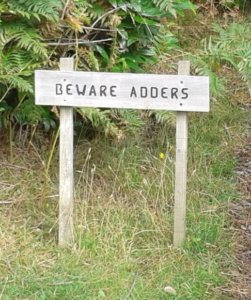Keith Wilson
It’s been a while since we last had a puzzle page in Forty-Three, but you might like to try this little challenge. It’s not too taxing and you could be surprised at the outcome. Please don’t cheat; try the puzzle before you read on. Simply look at the diagram and work out what you need to change to make it symmetrical around the vertical red centre line. There are no hidden tricks. Squares can be grey or white. That’s all there is to it!

What was your solution? Did you (mentally) colour in the two middle squares in the far-right column? If so, you’re in excellent company. When a similar test was posed as part of a study in the USA, 80% of people did exactly that. Only 20% saw the alternative: remove the two grey squares in the far-left column. The study was an investigation into whether people systematically overlook solutions that involve removing things, preferring to favour solutions that add things – and it found that they do.
How is this relevant to Quakers? Hmm. Well, the authors of the study (full reference below) say,
“Defaulting to additive changes may be one reason that people struggle to mitigate … damaging effects on the planet.”
Personally, I think that’s reasonably relevant!
And there’s more! I was introduced to this study by my good friend Bodo Winter, an exceptionally talented linguist working at University of Birmingham. Based on the study’s findings, he carried out research to see whether the preference for additive solutions was reflected in language. In short, his results (as yet unpublished) confirm that it is. He found that words related to addition are more frequent and slightly more positive than those related to subtraction. He also found that verbs like ‘change’ and ‘improve’ are more closely related to ‘add’ and ‘addition’ than to ‘subtract’ and
‘subtraction’.
It seems that not only are we predisposed to prefer solutions that involve addition, it’s possible that we also talk – and maybe even think – about these solutions more easily and more positively. I wouldn’t like to speculate about why this might be. Are we born favouring additive solutions, or have we been conditioned by the consumer society in which we live? Answering that question is, I’m afraid, going to be left as an exercise for the reader!
Those of you who know me well will know that I struggle with the Quaker testimony to simplicity; my home is more of a testimony to clutter! It’s unlikely that the findings I’ve reported here are going to change that any time soon. They have, however, made me realise that in deciding between adding and subtracting, I have an in-built bias for which I need to compensate, and I need keep in mind that it’s easier and more comfortable to think and talk about adding than subtracting.
I wonder if awareness of these factors could also be helpful in our Quaker decision-making processes. In short, might we benefit from putting in the extra effort it takes to think less?
The article referenced is: Adams, G.S. et al. (2021)
‘People systematically overlook subtractive changes’, Nature, 592(7853), pp. 258–261.
doi:10.1038/s41586-021-03380-y.

During the final stages of proofreading this newsletter, Anne Watson sent this merry response to Keith’s article.
Watch for her full explanation in Forty-Three’s July issue!
| Previous Article | Next Article |
Back to June 2022 Newsletter Main Page
Forty-Three Newsletter • Number 518 • June 2022
Oxford Friends Meeting
43 St Giles, Oxford OX1 3LW
Copyright 2022, Oxford Quakers
